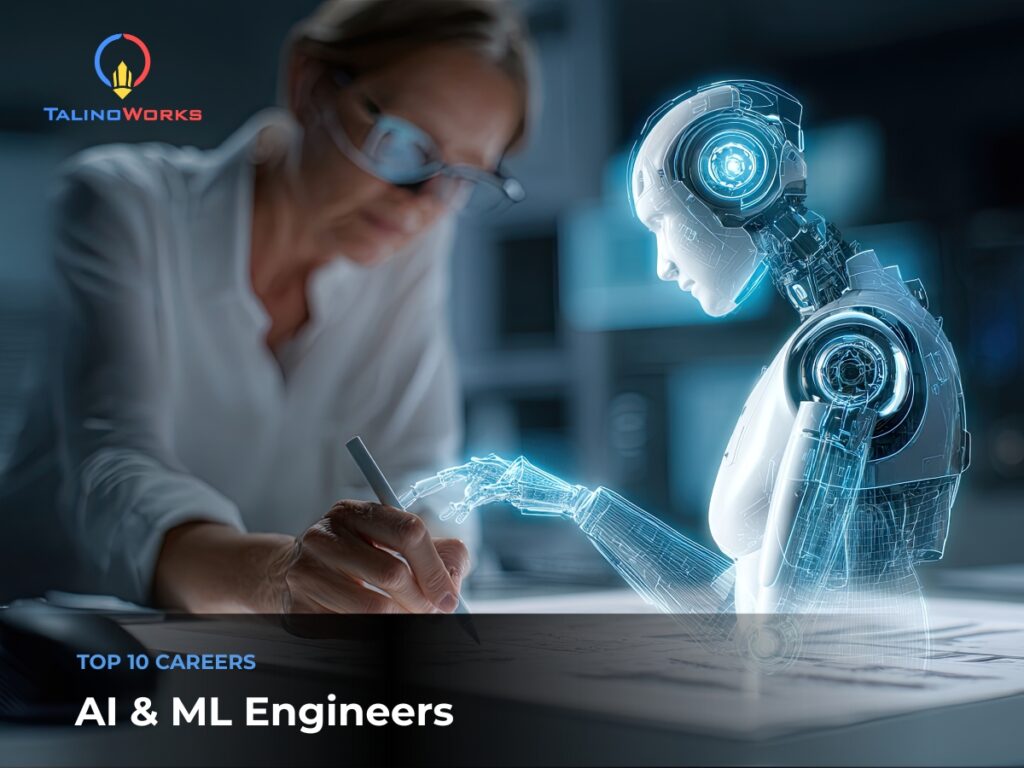| Key takeaway: The most in-demand IT careers are no longer just technical roles. They’re business-critical positions that drive growth, resilience, and innovation. From AI engineers to remote IT support, these jobs define how companies will compete in the next five years.Tech is moving fast. AI, cloud, and remote work are changing everything, from how we build to how we hire. Roles that barely existed five years ago are now essential. The rise of digital-first businesses means every organization, from startups to global corporations, depends on tech talent to stay competitive.If you’re in tech or hiring for it, here’s what you need to know. These are the 10 IT careers that will shape the industry in 2025 and beyond. |
The IT job market is evolving at lightning speed.
For employers, the challenge is building teams with future-ready skills.
For professionals, the priority is learning and adapting to stay competitive in a global workforce.
Today, we’re sharing some of the top IT roles that will be in demand in the next five years.
If you’re planning to upscale, or thinking about where your IT business should go, this one’s for you.
Why Tech Hiring Is Booming
Businesses aren’t just adding tools.
They are rethinking workflows around data, speed, and smarter decision-making.
Tech hiring is no longer about keeping systems running. It’s about solving real problems.
Teams now use automation to build faster, cut costs, and understand customers better.
With AI part of daily operations and remote-first teams opening global talent pools, the demand for skilled professionals has never been higher.
Digital transformation is at the heart of this shift.
Retailers analyze buying behavior in real time, hospitals rely on predictive analytics for patient care, and manufacturers use IoT to optimize production.
These advances require specialized IT roles that go beyond traditional support.
Tech staffing agencies bridge the gap, connecting business challenges with people who can solve them and ensuring the right skills meet the right opportunities.
The Top 10 IT Roles in 2025
1. AI/ML Engineers
AI/ML Engineers have shifted from research to core business. They prepare datasets, train models, and integrate them into production systems that power fraud detection, recommendations, and analytics.
Mastery of Python, TensorFlow, and cloud ML platforms is essential. Analysts project AI spending will hit $407B by 2027.
These engineers influence how companies automate, personalize, and compete.
AI/ML engineers help businesses innovate while reducing operational costs. The top industries that may benefit from this are banking, healthcare, and e-commerce.

2. Cybersecurity Specialists
Security has moved to the front line.
Specialists now work with developers and architects to design safe systems before launch.
Using tools like Splunk and zero-trust frameworks, they combat ransomware and insider leaks.
Experts estimate cybercrime will cost $10.5T annually by 2025.
Businesses rely on them to avoid breaches, protect customer trust, and meet compliance.
With data regulations tightening worldwide, cybersecurity specialists also play a role in ensuring companies stay legally compliant.
This makes them invaluable to any business.
3. Cloud Engineers (with AI Integration)
Cloud engineers are architects of scale. They design hybrid systems that handle AI-heavy workloads and real-time data.
Skilled in AWS, Azure, and Kubernetes, they optimize systems for banking apps, fintech, and global video platforms.
Their work ensures services run smoothly and cost-effectively.
Cloud is now the backbone of business operations.
Beyond performance, cloud engineers also focus on sustainability. They help companies reduce carbon footprints by building efficient digital architectures.

4. Generative AI Specialists
Generative AI is no longer experimental.
Specialists fine-tune large language models, design prompts, and build workflows that integrate generative tools into products.
Their role combines creativity and technical skill.
They help companies cut content costs and deliver personalization at scale. From marketing teams producing campaigns to HR departments drafting policies, these specialists make AI a practical business tool.
5. Data Scientists & Analysts
Data experts have grown from report makers to strategy shapers.
They use SQL, Python, and BI tools to uncover insights, predict outcomes, and guide decisions.
Their role bridges raw data and business direction. Researchers forecast global data will reach 181 zettabytes by 2025.
Their ability to turn complexity into clarity is critical for leaders.
For example, airlines depend on analysts to optimize flight schedules. Healthcare providers rely on them for patient outcome predictions.
6. DevOps / MLOps Engineers
DevOps and MLOps engineers keep innovation running.
They automate deployments, manage infrastructure as code, and monitor machine learning models in production. Their focus is on reliability and speed.
The demand for these skills will grow as AI adoption accelerates.
In industries with constant updates, like gaming or fintech, DevOps ensures seamless releases,. MLOps guarantees AI models stay accurate and fair.

7. Full Stack Developers
Full stack developers remain versatile players in tech.
They build across the stack, from user interfaces to backend logic.
Using React, Node.js, and cloud services, they turn ideas into products quickly.
Full stack developers give lean teams speed and adaptability. Startups especially benefit, since these developers can handle multiple roles without sacrificing quality.
8. Product Managers (for AI & Tech)
Modern product managers balance vision with practicality.
They set priorities, align stakeholders, and ensure features translate into user value.
In AI-driven products, they add accountability, making sure tools are ethical, usable, and impactful.
PwC predicts AI will add $15.7T to the economy by 2030.
PMs prevent wasted investment and guide teams toward what matters.
Their leadership ensures that technical innovation aligns with customer needs and business outcomes.
9. UI/UX Designers (with AI Awareness)
Design today is about clarity and trust.
UI/UX designers shape how users interact with intelligent systems, making automation feel transparent and intuitive.
Using Figma, prototyping, and UX writing, they make complex tools approachable.
A McKinsey report shows design-driven companies outperform peers by 32% in revenue growth. Their work directly impacts user adoption, retention, and brand loyalty.
10. Remote IT Support Specialists (AI-Enabled)
IT support has expanded beyond office walls.
Specialists now manage uptime across global teams, diagnose issues with AI-driven tools, and document fixes.
Human expertise remains critical for edge cases. For businesses managing remote workforces, strong IT support directly reduces downtime and boosts team performance.

What This Means for You
For tech professionals: These careers aren’t just buzzwords. They are pathways to long-term growth.
Focus on real projects, stay adaptable, and build skills that show results.
Upskilling in cloud, AI, or data analytics will keep you relevant in a fast-changing market.
Joining professional networks and leveraging IT recruitment agencies can also open doors to global opportunities.
For employers: Tech talent moves fast, and waiting means losing out.
Hire for adaptability and mindset as much as technical skill.
Partnering with technology staffing agencies helps reduce hiring risks and shortens time-to-hire.
Investing in career development and culture fit keeps top talent engaged for the long haul.
Tech isn’t just the future. It is the infrastructure of growth.
The question isn’t when to act, but whether you have the right people in place now. The companies that prioritize these roles today will be the ones leading their industries tomorrow.

